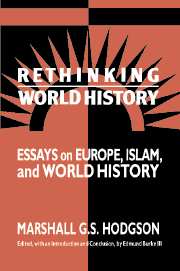Book contents
- Frontmatter
- Contents
- Editor's preface
- Introduction: Marshall G. S. Hodgson and world history
- Part I Europe in a global context
- 1 The interrelations of societies in history
- 2 In the center of the map: Nations see themselves as the hub of history
- 3 World history and a world outlook
- 4 The great Western Transmutation
- 5 Historical method in civilizational studies
- 6 On doing world history
- Part II Islam in a global context
- Part III The discipline of world history
- Conclusion: Islamic history as world history: Marshall G.S. Hodgson and The Venture of Islam
3 - World history and a world outlook
Published online by Cambridge University Press: 18 December 2009
- Frontmatter
- Contents
- Editor's preface
- Introduction: Marshall G. S. Hodgson and world history
- Part I Europe in a global context
- 1 The interrelations of societies in history
- 2 In the center of the map: Nations see themselves as the hub of history
- 3 World history and a world outlook
- 4 The great Western Transmutation
- 5 Historical method in civilizational studies
- 6 On doing world history
- Part II Islam in a global context
- Part III The discipline of world history
- Conclusion: Islamic history as world history: Marshall G.S. Hodgson and The Venture of Islam
Summary
As nearly as anyone can tell, there are as many people in China as in mainland Europe; and more people in China and Japan together than in Europe with Great Britain. Furthermore, that situation has probably existed for a very long time, since all will admit that China was a civilized land even before Europe. Surely China's fate, then, purely from the point of view of human beings, is in general just as important as is Europe's.
Yet, there is an incongruous situation in our social sciences, and most particularly in our history writing, which has sometimes been noted, but about which nothing to my knowledge has ever been effectively done. The up-to-date general histories mention China in one or two chapters, whereas they spend all of the rest of their time on Europe. Is this because only Europe has changed, only Europe has had things happen? Anyone who has studied the history of China will tell you this is not true. Is this because most of mankind now lives in a European culture, and the Chinese culture patterns have been ended?
Is it true that Europe has colonized vast areas; but the only dense population resulting has been in the United States. With all her colonies, Europe still has not a great deal more population than China and Japan, whose past culture certainly has not ended. The history of Chinese culture, then, is very nearly as important, from an international point of view, to modern world humanity as is the history of Europe.
- Type
- Chapter
- Information
- Rethinking World HistoryEssays on Europe, Islam and World History, pp. 35 - 43Publisher: Cambridge University PressPrint publication year: 1993

